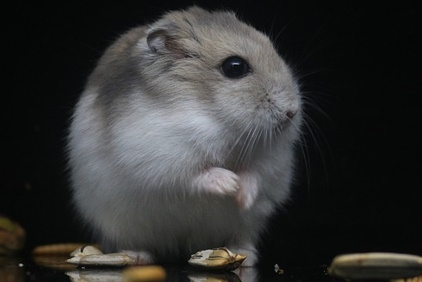Campbells Hamster Diet
Hamsters are omnivores, which means that in the wild their natural diet includes insects as well as grains and seeds. It is important to give your hamster a balanced diet and pay attention to any new evidence that helps refine this. Many commercially available hamsters mixs are low quality and full of filler items, similarly avoid the overally sugary treats, especially for hamsters prone to developing diabetes.
Water
Should always be available and changed daily. A bowl or bottle is fine for this, if using the latter just keep a careful eye on them as they can get clogged.
Seed mix
A good quality hamster mix with a range of seeds.
Fresh
Small amounts of fresh fruit, vegetables or herbs. Foods that are high in water content should be given sparingly due to the diarrhoea risk. Items like cucumber can be placed in a hamster carrier during a long journey where other water sources cannot be given.
Do not feeds citrus fruits such as oranges, lemons or grapefruits.
Protein
A small amount of protein can be given on a semi-regular basis, items such as mealworms, cheese, monkeynuts and scrambled egg.
Hay
Timothy hay is a good quality variety of hay that is high in fibre and provides additional enrichment for small pets. Avoid other types of hay and never give straw, due to the danger of it damaging cheek pouches.
Treats
Sunflower seeds, pumpkin seeds, mealworms, cooked soya beans (thought to reduce the likelihood of tumours), stale or toasted wholemeal bread as well as pet-shop treats that aren't too high in sugar.

